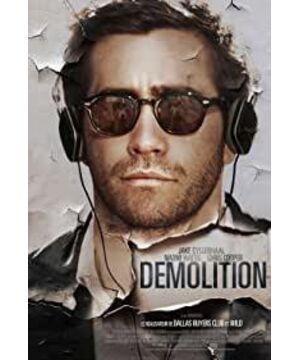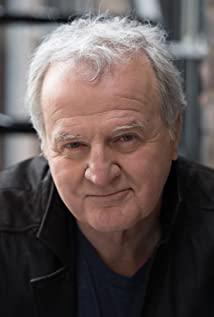A "Stealing Heart" in 2004 once described what a person who no longer loves would do. Jude Law at the time of the breakup, despite being indifferent to the sobbing lover, did not lose sympathy. He fell into a new relationship as quickly as before. The more common divorce scenes are always filled with tears and silent anger. This is not the case with the protagonist of this film. Not only is he indifferent to the death of his wife in front of his eyes, but he is never troubled by bloody memories. Lost interest in life itself for no apparent reason, and began to notice strange details. A good winner in life is not inappropriate, luxury villas are smashed casually, social norms have lost their meaning, father-in-law is completely ignored in front of human feelings and morals, and it is not ashamed to die in public. I was casually called by the customer service phone at two o'clock at night to condolence, and I simply moved to live with someone I didn't know. The stranger who was chatting on the train asked, since you don't love her anymore, how do you feel now that she died, his response was to stand up abruptly, pull the trigger of the train's emergency brake, and calmly be sent to the Public Security Bureau.
He didn't write those letters to the customer service of the vending machine because no one could talk to him--is the life report he wrote in great detail an unspeakable emotion? "There's a coffee machine in front of my garage. I didn't order it. My dad came to fertilize the tree by the door at 7 am in the morning talking to himself, obviously I hired a gardener to do it... Go to the airport, Seeing all kinds of travelers coming and going, I suddenly want to dump all their luggage and pile it up into a mountain. When you go to a place like Buffalo, what do you have to bring?" He imagined that his heart was eaten by moths. half.
Another detail, the last words his wife said before she died, was to accuse him of being indifferent to the leaking refrigerator at home for two weeks. However, after his wife's death, he didn't even remember it at all. No self-blame either. A few days later, I suddenly noticed that the refrigerator was leaking. In a fit of rage, I dismantled it together with the company's toilet door, the computer in the office, and the bad light at home. Turning life into a small difference is probably to this extent.
Lived step by step to the desired mode, but found that I forgot why. Life seems to be the standard on Wall Street, and the scholarship teenagers among them have been rehearsed for a long time. His mental order went astray after the car accident because the life before the car accident had long lost its meaning to him. He just repeats what he once thought should be done, and perhaps the feelings originally invested in it have long been suppressed or forgotten in the process of maintaining the glossy surface. The occurrence of the car accident reminded him that this mechanized life actually has no subjective reasons to support it. At this time, for him, the things that ordinary people think are absurd are no longer different from the things that "should be done" - at least, he can still be casual. The repression of modern civilization makes him no longer able to invest his feelings in his subjective choices, and he can no longer make choices because of subjective feelings.
Numbness, a unique psychopath of modern people, has many precedents in the Western literary world. The prime example is Camus' Outsider. The protagonist of The Outsider, like the protagonist of the film, is indifferent to his mother's funeral, so he is considered to have killed his mother. Have no feelings for other people or things in life at all. Even his venting to the priest who forcibly preached was because he was so annoyed that he couldn't bear it, and there was no real emotional content. The only expression of emotion is the dawn before the execution - only the world is silenced, the smell of earth and sea salt is smelt, and the quiet summer night is allowed to soak through like a tide. At this time, the dying person embraced the power of the world itself, and experienced a kind of fraternity for disorder and indifference itself:
"Faced with the night full of information and starry sky, for the first time, I am fascinated by this world. Indifference opened my heart. I experienced the world so like me, so friendly, I felt that I was happy in the past and I am still happy. To make everything perfect, to make me feel less lonely, I I also hope that many people will come to watch the day I am executed, and I hope they will respond with shouts of hatred."
Compared to this film, outsiders are not redeemed. In other words, the redemption he obtained can only result from the individual's submission to the original force of nature, a redemption similar to religious revelation. In last year's Submission by French writer Michel Houellebecq, it also depicted a professor of literature who was insensitive to everything except academics. He is down and lonely, eats frozen food every day, indulges in TV and porn, and sleeps for years as a female student but always disappears after the summer vacation. He couldn't be in a long-term relationship with anyone. Only when reading novels can one feel the "sincere emotional communication between people". After a political drama in the general election, he chose to convert to Islam, and in a form of self-deception, he regained his faith to heal his terminally ill spiritual world.
As early as 1903, the German sociologist Georg Simmel's famous article "The Metropolis and the Spiritual Life (Die Großestadt und Das Geistesleben)" analyzed this kind of "numbness and empty rich man" so common in literature. origin of. In the age of Nietzsche and psychoanalysis, Simmel interprets this problem as the reshaping of the individual psyche by the modern city. The opening chapter (in English) reads:
"The deepest problems of modern life derive from the claim of the individual to preserve the autonomy and individuality of his existence in the face of overwhelming social forces, of historical heritage, of external culture, and of the technique of life. (The deepest problems of modern life stem from the individual's attempt to maintain independence and individuality in the face of social forces, the burden of historical traditions, the material culture and technology in life.)"
“thus the metropolitan type of man—which, of course, exists in a thousand individual variants—develops an organ protecting him against the threatening currents and discrepancies of his external environment which would uproot him. He reacts with his head instead of his heart. (The quintessence of the urbanite—which, of course, presents hundreds of individual variants—creates a mechanism of protection against the extreme chaos of fluctuations and ruptures in the external environment that threaten it. Fight it with reason, not with heart)" (1)
For Simmel, the state of mind of modern man is accompanied by this ever-changing world. The most distinctive feature of modern people is that they require objective reason to dominate all aspects of life, while subjective feelings are regarded as secondary, and even retreat to the corner of consciousness, which can only be swept out by disguising other forms, such as literature and art. This worship of objective and rational standards is actually a defense mechanism subconsciously cultivated to adapt to changes in the environment. Human beings are not close to human feelings, in order to reduce the consumption of personal emotions in public life and resist the impact of the external society on the subjective self. The worship of "objective reason" stems from a desperate attempt to distrust one's own will, and from the increasing difficulty of coordinating personal feelings with the fast-moving social machine. However, this kind of taken for granted that what is "good" in an objective rational sense—such as maximizing economic benefits, such as a standardized route to a successful life, such as the fact that scientific truth must be expressed mathematically—includes a kind of wishful thinking. It seems that as long as you reach some objective and rational quantitative standard, you can step on the road to personal happiness or truth. But these are irrational conventions that make us willing to sacrifice our subjective will and subjective choices, and depend on the accidental foothold of an era and society.
Simmel also blames the monetary economy for the numbness of modern urbanites. In a monetary economy, the relationship between people is simplified to the most "objective and rational" level that can be quantified, that is, the transaction relationship. A person who is devoted to it 24 hours a day, and who has been measuring relationships in this quantitative mode for a long time, his attention can only be attracted by quantitative information. Unquantifiable, the natural attributes of people and things are bluntly discarded. But in the primitive economy, because the transactional relationship is built on the interpersonal relationship, the subjective all-round perceptual experience takes precedence over the quantitative relationship. Marx's 1844 manuscript also speaks of a similar point: in primitive economies, the individual realizes meaning in labor because the relationship with the fruit of labor is very direct: a skilled craftsman, who has worked hard to create a work of art, He was naturally proud. However, in the process of assembly line production and specialization, it is difficult for individuals to find the meaning of their own labor.
Returning to the theme of this film: the financial world seems to be prolific protagonists such as "numb and empty rich people", perhaps because they push interpersonal and transactional relationships to the extreme of quantification. This is also reflected in the fact that the protagonist cannot scroll through his mind for a while, similar to the quantitative thinking of "So-and-so company wants 5% of the financial reserve", switched to "water leaking from the refrigerator at home" and "I haven't cared about what my wife is doing for a long time." Come on.” These specific, flesh-and-blood things are coming. He was absent-minded when his wife told him these things, and it took a few seconds to realize what the problem was. Furthermore, when he was asked why he wanted to get married, he said it was because of simplicity. Taking advantage of the relationship of the husband can naturally become a company executive, and the fiancee meets the public aesthetic standards, why not do it? After they get married, they become the model couples that everyone admires. Now that they are already well-received, what else do they need to worry about? Even if it is not the most direct quantitative money relationship, the purpose of marriage as understood by the protagonist is to achieve some quantifiable objective standards.
Simmel writes that the most common example of the modern city is a "blasé attitude". It means a cynical, obsessive attitude towards pleasure. Symptoms usually appear in calculating modern people (especially professional people), such as Wilde's pampered and highly poisonous Lord Henry, such as Maury (2) in Fitzgerald's "Beauty and Destruction", and now various A high-value, high-value investment banker who uses routines to deceive sleep.
"The blasé attitude results first from the rapidly changing and closely compressed contrasting stimulations of the nerves. From this, the enhancement of the metropolitan intellectuality, also, seems originally to stem... A life in boundless pursuit of pleasure makes one blasé because it agitates the nerves to their strongest reactivity for such a long time that they finally cease to react at all.”
In other words, Simmel believes that this hedonic numbness is caused by overstimulation of the senses and the breakdown of the defenses of the mind Mental numbness. Obviously, in the spirit of the age of entertainment to death, in the excessive suppression of the mechanized life model imposed by the market economy, excessive sensory stimulation has led to the collapse of healthy minds. This morbidity is especially pronounced in The Wolf of Wall Street. What's further than this film is that the characters in The Wolf of Wall Street have gone too far in their lust for extravagance, and the perceived attributes of natural persons have also suffered permanent damage. In the process of material filling the void, the constant sensory stimulation day and night further reduces life to a purely conditioned reflex.
Simmel's contemporary literary critic and philosopher Walter Benjamin, in "Baudelaire", similarly understood the psychopathology and aesthetic loss of modern people as the failure of the mind's defense mechanism against external upheaval. Freud used the chemical homeostasis of the cell as a metaphor for the defense mechanism of the mind:
“for a living organism, protection against stimuli is almost more important than the reception of stimuli. The protective shield is equipped with its own store of energy and must above all strive to preserve the special forms of conversion of energy operating in it against the effects of excessive energies at work in the external world—effects that tend toward an equalization of potential and hence toward destruction. (For organic organisms, it is more important to protect themselves against stimuli than to receive them. Defense mechanisms develop their own energies Reserve, must bear the brunt of the preservation and promotion of this energy, against the changing energies of the outside world.)” (3)
For Benjamin, Freud’s point of view explains why popular aesthetics have become increasingly vulgar and blatant A kind of naked sensory stimulation. Sensory stimuli disrupt defense mechanisms and cause mental numbness, allowing the masses to seek higher-intensity sensory stimuli, and the cycle continues. Over time, the most direct and complete experience of life no longer exists, the long-term alienation of natural feelings, the loss of the ability to recognize complex emotions, and the deterioration of aesthetic ability.
This also explains why the old man who sells grass, facing the abandoned carousel, would say something like: "Isn't that a beauty? But nobody wants carousels anymore. They want roller-coasters that go upside down and make you puke.”
Similar to the lost generations of modern people, what the protagonist of this film has lost is not actually his so-called "true self". What he has lost is the ability to perceive and make decisions on his own at this moment, without being dictated by the desires, values, and standard definitions of "happiness" imposed by society. What he loses is the direct experience of life as a natural person. Taking a step back, the "true self" or the heart in chicken soup, in the final analysis, is this ability that requires willpower to make choices every moment, and to bravely step into the unknown. What is the "true self"? Can it be "found"? It is not something pre-existing. People's definition of self is accumulated from the choices they have made.
After meeting the little boy and his mother who lived as they wished, the protagonist regained the perception ability of a natural person and gradually recalled the true face of his wife. The last awakened feelings for his wife are not so much love as tenderness and recognition. It is similar to the realization that "people come into this world to support each other to get through life". Before that, his experience of life was both estranged and externalized. He has never thought about what happiness is, nor has he used his own will to follow and make mistakes. Even his desires are the result of mass production on an assembly line.
=========
(1) Simmel, Georg. “The Metropolis and Mental Life,” 35-7.
(2) Maury said this: "After all, Anthony, it's you who are very romantic and young. It's you who are infinitely more susceptible and afraid of your calm being broken. It's me who tries again and again to be moved --let myself go a thousand times and I'm always me. Nothing--quite--stir me." The Beautiful and Damned, (?)
(3) Benjamin, Walter. The Writer of Modern Life: Essays on Charles Baudelaire , 176.
View more about Demolition reviews











